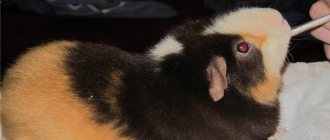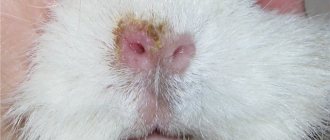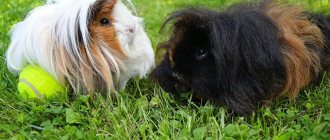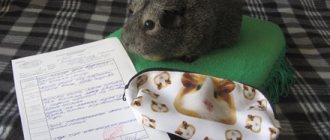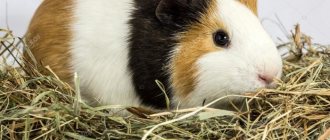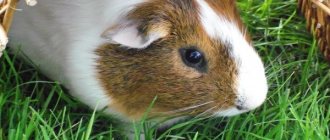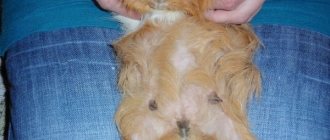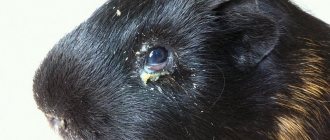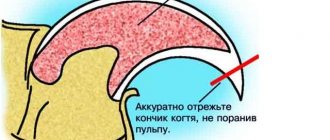- home
- Guinea pig
- Guinea pig health
02/06/2019 A guinea pig can catch a cold if the rules for keeping the pet are violated. Owners of a delicate animal need to know what to do in such cases and how to recognize the disease at an early stage. This is very important when it comes to a small pet. Knowing the symptoms of a cold gives you a chance to start treatment in a timely manner.
What can cause a pig to have a cold?
Rodents naturally have strong immunity. It is weakened if the conditions of detention are violated and the diet is formulated incorrectly.
The causes of a cold can be the following:
- the pet’s cage is in a room where the temperature is below +18℃ and hypothermia occurs;
- the rodent has been in a draft or near a working air conditioner;
- after bathing, the animal was not dried enough and was wet for a long time;
- There was raw filler in the cage for a long time.
A cold in a guinea pig can occur after contact with a sick person. Therefore, you should not handle the animal until it recovers.
A note for the caring guinea pig owner. Guinea pig diseases
Hold your pet daily
. This is not only very pleasant, but also useful, because with close contact you get a unique opportunity to carefully examine your ward for all kinds of diseases. And the regular stroking that the pig receives from you has the best effect on the condition of its fur, which is thus renewed and a new one immediately grows in place of the old one.
Every day carefully
inspect the animal's fur and eyes for clouding of the lens. Let's evaluate the character of the animal. He should be calm and affectionate, although each pig may have its own individual character traits. The main thing is that your favorite creature is not aggressive. If you notice any abnormalities, contact your veterinarian or veterinarian as soon as possible, even if it seems like a minor thing. But later this can develop into a fairly serious problem that will require long and lengthy treatment.
Now there is no longer any need to look for a veterinary clinic, because you are on our website and reading this article. Here at any time you can get qualified advice from professional doctors “YA-VET”, who are always ready to help.
Which veterinary clinic to choose for treatment of guinea pig disease
In order for your beloved guinea pig to recover, it is necessary to find a qualified specialist as soon as possible who can make the correct diagnosis and prescribe adequate treatment. After all, a correct diagnosis of guinea pig disease is already half the success. Further responsibility lies entirely with the owner - the health of the rodent depends only on him. You will need to carefully follow all doctor's instructions
, such as following a diet, giving the necessary medications on time, which will help you recover faster.
You will also need to take care of the proper maintenance of the guinea pig. It is unacceptable to place the cage in drafts. The pet may be blown away. It is also recommended that during the recovery period, the greatest attention be paid to the cleanliness of the cage in which the pet lives. This also plays an important role in recovery, because these harmful microorganisms are also present in urine and feces, which can then come back.
The specialists of our veterinary clinic “YA-VET” have the necessary education, which allows them to provide comprehensive assistance. Remember that guinea pigs are a blessing that nature itself gave us and should be cherished like the apple of our eye. For all their charm, these pets are quite gentle and need to be protected from any diseases that a difficult life can give.
How to recognize a cold in a mumps
If you pay close attention to your pet, you can immediately notice the signs of a cold:
- the animal is lethargic and does not want to drink or eat;
- sneezes and rubs the nose area;
- breathing becomes heavy and uneven;
- coughs and wheezing is heard;
- eyes become red and swollen;
- mucus comes from the nose and eyes;
- the rodent freezes in one position for a long time;
- the fur becomes dull and ruffled;
- body temperature rises.
The pet needs to be taken to the vet immediately. To treat on your own means to expose yourself to the risk of complications.
A runny nose in a guinea pig is not a harmless symptom of a cold. It is necessary to immediately clear the nasal passages of mucus to allow the animal to breathe normally and prevent the infection from spreading to the lungs.
Cough treatment
Particular attention should be paid to the animal if it is coughing. It can be a sign not only of respiratory inflammation (colds, bronchitis, pneumonia), but also a symptom of the presence of parasites, heart disease or dental problems. If a runny nose is observed when coughing and the animal wheezes, then most likely there is a cold, and the mumps should be taken to a veterinarian to get advice and determine if there are any complications. In other cases, a visit to the veterinarian is also inevitable.
Important! If a pig coughs while eating, and the process of eating food itself is painful for it, then an examination of the oral area is necessary, since the cause may be pathological regrowth of teeth. The animal eats little, loses weight and has severe drooling.
For bronchitis
A cough can be a symptom of bronchitis that develops due to a cold, hypothermia, infection or parasites. Dust or smoke in the room can provoke bronchial disease. With this disease, the animal coughs heavily and breathes heavily. A debilitating cough is often accompanied by a runny nose and conjunctivitis. The severe condition causes loss of appetite and exhaustion. In advanced cases, the pet may die.
For bronchitis, antimicrobial expectorants, hormonal and anti-inflammatory drugs are prescribed. The sick animal is also given vitamins and immunomodulators. Among them there must be ascorbic acid, since it is not produced by the body of this rodent, but comes from the outside. The nose and eyes are washed and instilled with anti-inflammatory drugs as necessary.
Pay attention to the information about how much guinea pigs cost.
For pneumonia
This disease occurs in acute or chronic form. Acute pneumonia is characterized by severe symptoms of the disease:
- severe cough;
- frequent difficulty breathing;
- high temperature;
- lack of appetite;
- low activity;
- tousled fur.
If you put a sick pig to your ear, you will hear wheezing. In the acute form, discharge from the nose and eyes is usually observed. The disease develops quickly, and if help is not provided to the sick animal in time, it may die in the next 3-4 days.
In the chronic form, these symptoms are less pronounced. They may not experience a fever or a significant decrease in appetite. Inflammation of the lungs in guinea pigs is treated with sulfonamide drugs (“Sulfadimezin” or “Sulfazin”). They are taken three times a day. A single dose is calculated from the ratio of 0.1 g per 1 kg of weight.
Important! Sulfonamide drugs are taken for at least several days. They remove inflammation well and normalize the animal’s condition, but they continue to be taken for another 4-5 days after the temperature drops.
In order for the animal to recover faster, it is given vitamins, a glucose solution and an expectorant decoction of herbs (coltsfoot, nettle) ¼ teaspoon three times a day. They can be replaced with a drop of Bromhexine syrup for children. It is also recommended for your guinea pig to take probiotics (Linnex, Bifidumbacterin). Treatment of runny nose and conjunctivitis is carried out.
Guinea pig snot
Nasal discharge in rodents can be of both an allergic and cold nature. This is how rhinitis of infectious origin, bronchitis and pneumonia manifest themselves.
Allergic snot in a guinea pig is liquid and transparent. These include red eyes, tears flowing, a rash appears on the skin, and hair begins to fall out. Allergens include:
- Filler;
- missing feed;
- meadow grass hay;
- houseplants;
- the use of chemical detergents to clean the cage;
- dust in the room;
- other pungent odors in the room.
If the pig is kept in an aquarium, then snot is possible from heavy fumes that come from the litter.
Allergens should be excluded and the pig should be given an antihistamine for children in liquid form. With a cold or infectious rhinitis, the animal snorts, touches its muzzle, and purulent mucus comes out of the nose and eyes.
A cold in small rodents can very quickly turn into pneumonia. To prevent the animal from dying, it must be treated immediately. First aid is to rinse the nose with chlorhexidine, which will prevent the cold and infection from going further. Instilling Derinat drops for children also helps.
For a purulent runny nose, streptocidal powder is blown into the nostrils. Specialists usually prescribe antibiotics or sulfonamides to a sick animal.
How to tell if your guinea pig has a cold
The animal's illness affects its behavior. Sneezing, coughing and runny nose are the main symptoms of a cold, but they are not the only ones. Sick rodent:
- Often rubs the muzzle (especially the nose);
- refuses food;
- snorts;
- breathes heavily (sometimes wheezing can be heard);
- looks weak and lethargic;
- remains motionless for a long time (most often lies, but can also sit).
The eyes of a pet with a cold turn red and the eyelids swell. In addition to a runny nose, there may be discharge from the eyes (tears or pus). The fur coat becomes dull and appears disheveled. The animal's body temperature rises. A sick pet often prefers to be in the far corner of his house and rejects all attempts by the owner to pull him out of the found “shelter”.
If these signs are detected, you should take the rodent to a veterinarian as soon as possible. Delay in seeking medical help will lead to the death of your pet.
Why does a guinea pig cough?
A cold is not complete without symptoms such as a cough in an animal. This is a protection that works to cleanse the respiratory channels.
A cough indicates the following troubles:
- There is something stuck in the animal's throat;
- bronchopneumonia, colds;
- dental diseases;
- damage to the animal's body by parasites;
- cardiac disorders.
An animal's cough always has a serious cause, which requires immediate contact with a veterinarian.
How to cure a guinea pig from a cold
A veterinarian can prescribe the correct treatment. Moreover, for a successful recovery, the owner needs:
- Contact the veterinary clinic in a timely manner.
- Strictly follow the specialist’s instructions.
- Follow the dosage and schedule of taking each prescribed drug.
Self-treatment risks complications and a sharp deterioration in the animal’s health. There is an exception to this rule - some help must be provided on your own before visiting the veterinarian. Namely, to clear a stuffy nose to make breathing easier and prevent the infection from spreading to the bronchi and lungs.
A runny nose can be a manifestation of one of the serious diseases. Flu, bronchitis, pneumonia, pseudotuberculosis are disguised as a harmless cold.
Let's return to the main thing - how and with what to treat a guinea pig for a cold.
What to do if your guinea pig has bronchitis
Bronchitis indicates a complication of a cold. Dust, smoke in the house, very low air temperature in the room, bacteria and parasites provoke a cough.
With bronchitis, the cough is intense and hard. A sick animal does not drink water; purulent mucus comes from the eyes and nostrils. If the animal is not treated, it will die.
The veterinarian will prescribe what to treat for bronchitis. Usually these are anti-inflammatory medications that enhance immunity, vitamin preparations, and phlegm removal products.
Diseases dangerous to people
Guinea pigs can be a source or carrier of diseases that are dangerous to humans. You can become infected with skin or intestinal parasites from an animal. Roundworms cause strongyloidiasis, and giardia causes giardiasis. Liver fluke can cause severe liver disease, which in most cases is fatal. From a guinea pig, a breeder can acquire diseases caused by bacteria and viruses: salmonellosis, tuberculosis and leptospirosis. The most commonly transmitted skin disease is lichen. Regular flu can be transmitted both from the breeder to the animal, and from the animal to the breeder. Avoiding infection is not difficult: you need to keep the cages clean, wash your hands after each cage cleaning, as well as after interacting with the animal, and avoid getting saliva or animal hair in your mouth. Any illness in an animal - use a disposable medical mask.
Pneumonia in a guinea pig
The consequence of an untreated cold in 90% of cases is pneumonia. In young animals this occurs in the cold season.
Causes:
- Drafts;
- increased dampness and cold;
- temperature changes;
- unsuccessful transportation;
- poorly thought out poor nutrition.
All this occurs against the background of a lack of vitamins, including C, when the animal does not receive enough fresh food enriched with vitamins.
Pneumonia can be acute or chronic. In the first case, the course is rapid and the animal dies due to high temperature, damage to the body by toxins and exhaustion.
The chronic form also shortens the pet's life expectancy. Against the backdrop of a sharp decrease in immunity, the animal gets sick more often and loses weight.
Symptoms indicate pneumonia:
- Refusal of water and food;
- cough (dry or wet);
- wheezes when breathing, whistling and gurgling are heard;
- lethargy, depressed state;
- no reaction to the owner’s voice;
- the nose becomes covered with dry crusts;
- eyes red, swollen, stuck together;
- the coat looks sloppy;
- lethargy and drowsiness.
Treatment occurs only under the supervision of a veterinarian. There is no need to hope for temporary improvements, which are quickly replaced by a sharp deterioration and death of the animal.
How to euthanize a guinea pig at home
The departure of a beloved pet is always stressful for its owners. But we must pull ourselves together and try to alleviate the animal’s plight.
If the animal's condition is incompatible with life, it may be more humane to euthanize it. This is done by specialists visiting your home or in a clinic.
Killing a guinea pig using barbaric methods is not relief from suffering, but mockery. Euthanasia involves administering painkillers so that the animal dies without pain and suffering. This procedure is carried out by a veterinarian.
The diagnosis and indications for euthanasia are also made by a veterinarian. You need to find out how much it costs to euthanize a pig at home, without going out, so as not to expose the sick animal to unnecessary stress.
If the guinea pig that brought so much joy to all family members dies, it is a very difficult sight for all family members.
Typically, veterinary clinics also offer animal cremation services. This option is especially suitable if you need to get rid of a guinea pig that has died from a viral infection.
If your pig is breathing heavily and wheezing
A cough does not always indicate diseases of the bronchopulmonary system. Sometimes this indicates cardiac pathology.
The animal needs quick help and advice from a specialist.
Symptoms of heart failure:
- The pig gasps for air;
- breathing heavily;
- periodic coughing;
- shortness of breath when moving;
- immobility develops;
- lethargy and apathy;
- paws are cool;
- fingers turn blue;
- coordination of movements is impaired;
- convulsions.
To stop heart and asthmatic attacks, you need to immediately drop 2 drops of Corvalol into the mouth and then let the animal smell cotton wool soaked in aroma oil. The animal is given an injection that includes aminophylline, dexamethasone, and furosemide.
They treat heart failure for a long time, maintaining vitality.
Heart drops are administered to the rodent using an insulin syringe with the needle removed.
An animal suffering from heart failure needs proper nutrition and good living conditions.
At the first symptom of illness, treatment should begin. The speed of recovery depends on the speed of contacting a veterinarian.
Ear diseases
If the guinea pig shakes its head, constantly rubs its muzzle with its paw, has become inactive, a large amount of wax and dark crusts are noticeable inside the ear, you can suspect that the pet has otitis media. The disease can be caused by mites, viruses, bacteria, fungi, or foreign objects entering the ear canal that cause inflammation.
With otitis media, the temperature rises. The inner surface of the auricle is hyperemic and inflamed. A sharp, specific smell emanates from the ears. On the outer surface you can see wounds, scratches, scratches. With bilateral otitis, the guinea pig becomes lethargic, stretches its neck forward or tilts its head to the side. When examining the ear, redness and severe pain are noted. Dry dark crusts, scabs, and ulcers are visible inside the ear.
Otitis media is very often complicated by pathogenic flora and can cause deterioration, partial or complete loss of hearing function, so treatment must be started immediately.
Animals are prescribed antibacterial medicinal drops, solutions, lotions, and symptomatic medications for general treatment. Before instillation of the ear, the ear canal is cleaned of contamination using antiseptics, and crusts and wax are carefully removed with a sterile cotton-gauze pad. All manipulations are carried out very carefully to avoid damage to the eardrum. Topical medications are instilled into each ear of the pet.
How to treat
A veterinarian should treat your guinea pig for a cold. The animal is undergoing treatment with medications: baytril, sulfazine. First, they look at the pet’s reaction to these drugs. In parallel, Linex or other drugs with bifidobacteria are prescribed.
Wash the nasal area with chlorhexidine. Inflamed eyes are washed with saline twice a day and Tsiprovet or Tsipromed are instilled.
The most important thing is cleanliness around the animal, fresh air, and absence of drafts. Expectorant herbal decoctions give good results. Sometimes it is advisable to give the animal a drop of a syrup-like medicine for children (Bromhexine).
Skin diseases
Skin diseases of guinea pigs are most often associated with improper housing and feeding conditions and are provoked by various skin parasites: mites, lice, lice, as well as fungi and allergies. The first signs are itching and the appearance of lumps on the skin, ulcers, most often purulent, scratching and hair loss. Skin diseases are not as safe as many people think.
Severe itching can lead an animal to exhaustion, heart attack and death.
It is possible to determine exactly why a guinea pig is itching and what type of parasite is causing the itching only in a veterinary clinic using skin scrapings. Most often, treatment consists of treating the animal with special shampoos. However, in case of severe damage, antibiotics and probiotics may be prescribed.
Injuries in rodents
Injuries, bruises, fractures in rodents
Can occur when falling from a height or improperly restraining the animal. Sometimes tissue or limbs are pinched. Injury is caused by using cotton wool as bedding instead of hay or sawdust. Lameness that progresses to complete impairment of limb function can result in self-amputation of the paw, especially in hamsters and rats.
Fractures and cracks of bones in rodents
They can happen while playing with children or fighting among themselves, when the cage door is quickly slammed shut. Characteristic signs are that the animal squeals in pain, swelling of the limb, lameness, and hematoma appear. With an open fracture, the bones break through the soft tissue and come out. It is necessary to immediately limit mobility, transfer the rodent to a small box or carrier, and take it to a veterinary clinic for treatment. Bites and wounds occur as a result of a fight with another animal. The wound should be washed with an antiseptic solution (for example, an aqueous solution of Chlorhexidine 0.05%) or saline, the rodent should be transferred to a small cage or box and taken to a veterinary clinic.
Self-treatment of rodents in case of injuries is not recommended, since wounds can become infected, and fractures can lead to further improper healing of bones or complete loss of a limb.
Common rodent diseases
Most often you encounter rodent diseases that develop due to improper care and unbalanced feeding.
Tympany (bloating in rodents)
A dangerous disease for rodents, since the accumulation of gases in the stomach or intestines can lead to death. The first symptom is an enlarged, firm and distended abdomen. You need to urgently consult a ratologist! To slow down gas formation, you can give your pet Espumisan or Sub Simplex to drink. Eliminate legumes, easily fermentable food, grapes, and bananas from your diet.
Diarrhea (diarrhea) in rodents
Short-term diarrhea in a rodent, combined with a healthy appearance, may indicate a non-infectious etiology of the disease. In this case, a slight nutritional adjustment will be required. Include high-quality hay in the diet, as well as high-fiber pelleted feed. It is also important to provide access to fresh water.
Constipation in rodents
Constipation in rodents is the absence of feces or a decrease in the amount of feces. The cause of the disease can be stress, pain, spoiled food, or a basic lack of water. The animal refuses to eat, becomes lethargic, and chatters its teeth. The stool becomes small, dry, or completely absent. In simple cases, it is enough to introduce more hay and fresh water into the rodent’s diet. In severe cases, such as gastrointestinal stasis in rabbits, drug therapy under the supervision of a veterinarian is recommended.
Overgrowth of incisors and cheek teeth in herbivores
This disease is characteristic mainly of herbivorous rodents. As a rule, guinea pigs, chinchillas, and degus often experience dental problems.
The development of malocclusion can be caused by a predominance of soft foods in the diet and a lack of coarse fiber. The rodent becomes picky about food, later refuses it, and loses weight. There is increased salivation and discharge from the eyes. Sometimes after eating, irregular bowel movements are observed. You need to see a veterinarian for dental treatment. Before this, you can force-feed the rodent - ground food. After grinding down the teeth, the veterinarian recommends introducing branches of fruit trees and hay into food.
Hamsters and rats are also characterized by lengthening of the incisors, associated with the lack of solid food and objects for grinding teeth. Overgrown teeth cause discomfort to the rodent and can injure its lips and soft tissues. Constantly adding wooden blocks to the cage and correcting the diet will help avoid this problem. These same representatives of the order of rodents have caries of cheek teeth. If your hamster or rat shows signs of pain when chewing food. If you are drooling or your cheek is swollen, you should immediately contact your veterinarian.
Treatment for tympany
The process is long, and efficiency depends on the scrupulousness of the owners.
1. Avoid all succulent foods during the recovery period.
2. Give probiotics as prescribed.
3. Introduce vitamin C into your diet.
4. Promote the activity of the animal.
Greens should be introduced gradually. First, they give you a piece of dried apple and a slice of carrot. It is necessary to ensure regular feeding of the following products:
- stems of fennel, artichoke, leaves of dill, parsley, basil;
- seeds of dill, anise, cumin;
- meadow herbs: chamomile, yarrow, dandelions, nettle.
Symptoms of tympany
A swollen abdomen is easily palpable upon contact with an animal. There are 3 stages of tympany development:
First:
The animal is hiding in a shelter, breathing heavily.
Second:
The guinea pig begins to panic from pain, which can be seen by its wide open eyes. Breathing becomes very heavy. She can lie on her side.
Acute condition:
the pet refuses to eat and squeals. Sometimes grinding of teeth can be heard.
If there is severe swelling, you should immediately contact a veterinarian or take measures yourself to save the guinea pig - there is a high risk of death.
